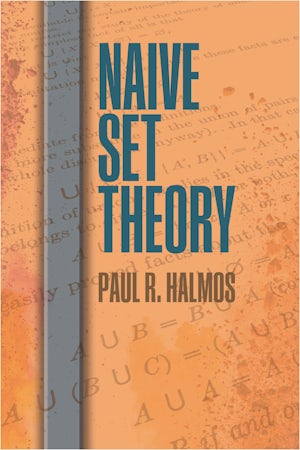

"This book is a very specialized but broadly useful introduction to set theory. It is aimed at 'the beginning student of advanced mathematics' … who wants to understand the set-theoretic underpinnings of the mathematics he already knows or will learn soon. It is also useful to the professional mathematician who knew these underpinnings at one time but has now forgotten exactly how they go. … A good reference for how set theory is used in other parts of mathematics." — Allen Stenger, The Mathematical Association of America, September 2011.
- Price: $12.95
- Pages: 112
- Publisher: Dover Publications
- Imprint: Dover Publications
- Series: Dover Books on Mathematics
- Publication Date: 19th April 2017
- Trim Size: 6 x 9 in
- ISBN: 9780486814872
- Format: Paperback
- BISACs:
MATHEMATICS / Logic
MATHEMATICS / Set Theory
Preface.
1: The Axiom of Extension.
2: The Axiom of Specification.
3: Unordered Pairs.
4: Unions and Intersections.
5: Complements and Powers.
6: Ordered Pairs.
7: Relations.
8: Functions.
9: Families.
10: Inverses and Composites.
11: Numbers.
12: The Peano Axioms.
13: Arithmetic.
14: Order.
15: The Axiom of Choice.
16: Zorn's Lemma.
17: Well Ordering.
18: Transfinite Recursion.
19: Ordinal Numbers.
20: Sets of Ordinal Numbers.
21: Ordinal Arithmetic.
22: The Schröder-Bernstein Theorem.
23: Countable Sets.
24: Cardinal Arithmetic.
25: Cardinal numbers.
Index
"This book is a very specialized but broadly useful introduction to set theory. It is aimed at 'the beginning student of advanced mathematics' … who wants to understand the set-theoretic underpinnings of the mathematics he already knows or will learn soon. It is also useful to the professional mathematician who knew these underpinnings at one time but has now forgotten exactly how they go. … A good reference for how set theory is used in other parts of mathematics." — Allen Stenger, The Mathematical Association of America, September 2011.
- Price: $12.95
- Pages: 112
- Publisher: Dover Publications
- Imprint: Dover Publications
- Series: Dover Books on Mathematics
- Publication Date: 19th April 2017
- Trim Size: 6 x 9 in
- ISBN: 9780486814872
- Format: Paperback
- BISACs:
MATHEMATICS / Logic
MATHEMATICS / Set Theory
Preface.
1: The Axiom of Extension.
2: The Axiom of Specification.
3: Unordered Pairs.
4: Unions and Intersections.
5: Complements and Powers.
6: Ordered Pairs.
7: Relations.
8: Functions.
9: Families.
10: Inverses and Composites.
11: Numbers.
12: The Peano Axioms.
13: Arithmetic.
14: Order.
15: The Axiom of Choice.
16: Zorn's Lemma.
17: Well Ordering.
18: Transfinite Recursion.
19: Ordinal Numbers.
20: Sets of Ordinal Numbers.
21: Ordinal Arithmetic.
22: The Schröder-Bernstein Theorem.
23: Countable Sets.
24: Cardinal Arithmetic.
25: Cardinal numbers.
Index

